EARN MONEY AND SAVE ON TUITION BY JOINING THE YACHTING INDUSTRY
Are you tired of sitting in an office all day, yearning for a more thrilling career? Are you looking for a cheaper alternative to university? If you have a passion for – or even just an interest in – sailing, then UKSA could be your dream come true.
UKSA, located in Cowes on the Isle of Wight, is a maritime charity dedicated to training the old and young for a career at sea. They have numerous programs available, so you’re guaranteed to find one that fits your needs.
The Yachting Cadetship is ideal for students. But the Professional Yachtmaster course is better suited to someone who might have already established themselves in a career but is looking for a change of pace. Read on to find out more.
Yachting Cadetship
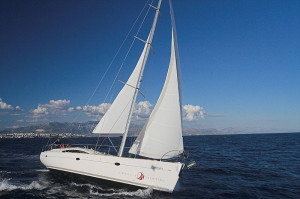 With
the high cost of tuition and the uncertainty surrounding the job
market, you may be thinking twice about attending college. But most of
us don’t want to be working a minimum wage job all our lives, struggling
to get by. UKSA’s Yachting Cadetship apprenticeship could be the perfect fit for someone who’s thinking of skipping university.
With
the high cost of tuition and the uncertainty surrounding the job
market, you may be thinking twice about attending college. But most of
us don’t want to be working a minimum wage job all our lives, struggling
to get by. UKSA’s Yachting Cadetship apprenticeship could be the perfect fit for someone who’s thinking of skipping university.Completing the cadetship makes you qualified to work as a Captain of yachts up to 200gt (gross tonnage), Chief Mate up to 500gt and Officer of the Watch on the largest super yachts that go up to 3,000gt. The programme is developed within the MCA’s (Maritime & Coastguard Agency) guidelines with structured training as well as paid periods of work experience.
The Cadetship is organised in a way that will prepare you for life on board a superyacht. There are already 30,000 superyachts worldwide that require over 150,000 crew members. And, as more people are drawn to yachts, more crewmen and women are needed to supply the demand.
This cadetship is an investment for a lifetime. The career benefits are endless, and qualify you to work on the world’s largest vessels.
 Alongside
the cadetship, you can also earn a foundation degree. This is a
university-accredited degree and is designed for learning within the
workplace. So while you’re out at sea and doing more hands-on learning,
you can also include some more traditional schoolwork to increase your
understanding of the industry.
Alongside
the cadetship, you can also earn a foundation degree. This is a
university-accredited degree and is designed for learning within the
workplace. So while you’re out at sea and doing more hands-on learning,
you can also include some more traditional schoolwork to increase your
understanding of the industry.Here are some of the facts:
- You must be between the ages of 18 and 25 to take the cadetship course
- The programme lasts three years with an option to take a foundation degree alongside the cadetship
- The tuition for the programme is £2,619 a year
- You’ll live on-site on the Isle of Wight, a short ferry ride from Southampton, in youth hostel-style dormitories. For an extra fee, you can have a private room. The extra fee goes toward UKSA’s charity
- The schedule is strict and structured (comparable to the army) in order to prepare you for the working conditions on a professional yacht as well as hone your life and leadership skills
- You’ll have up to two years of paid work plus tips that largely offset the cost of tuition
- You’ll receive career guidance and assistance with your CV upon graduation to help you land a job in the industry.
- You should have an interest in a career in the yachting industry
- You’ll need to pass a UKSA Cadetship interview, where a member of staff will sit down with you and get a feel for how passionate you are about a life at sea. Experience isn’t required, but they do need to see that you are serious about the programme. The interview helps UKSA get to know you and make sure you have the qualities they are looking for
- There are no formal qualifications, but communication skills (oral and written) as well as an ability with maths is necessary.
Admittedly £2,619 can still be an intimidating cost. Luckily, Trinity House pays 75% of fees for four students each year. Trinity House is
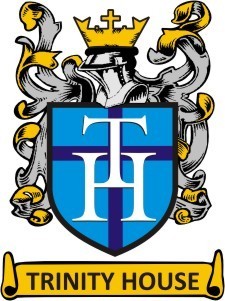 the
official General Lighthouse Authority for all of the UK aside from
Scotland. Beginning in 1514, the corporation was organised by Henry
VIII.
the
official General Lighthouse Authority for all of the UK aside from
Scotland. Beginning in 1514, the corporation was organised by Henry
VIII.If you’re a recipient of the grant, you’ll also receive a living allowance of £200 a month. Applicants for this bursary are interviewed to assess their financial situation.
Contact UKSA for more information.
How much can you make?
 A cadet who has finished training and earned their Officer of the Watch certification can expect to earn around £3,000 a month.
A cadet who has finished training and earned their Officer of the Watch certification can expect to earn around £3,000 a month.The two years of paid work placement take place near the beginning and the end of the cadetship. For the first placement, which takes place after your first 19 weeks in the course, you’ll be a crew member on a yacht of at least 15m. You will also be in contact with a mentor. For the second placement, you’ll take on a senior position where you will learn more about vessel operations.
Professional Yachtmaster course
The Professional Yachtmaster course is ideal for someone older than 25 who’s looking for a career in the yachting industry. All the training and necessary mileage is included in the course for a RYA/MCA Yachtmaster certificate with commercial endorsement. After you’ve completed the course, you’re qualified to work on vessels up to 24m. Here are some highlights:- You don’t need any pre-requisite experience, just a desire to spend life at sea
- All of your training and mileage (2,500 miles) is included in the programme
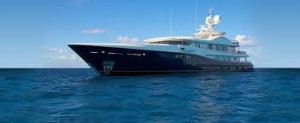
- You will have overseas experience when you complete one 600-mile passage
- You’ll develop command skills and confidence with self-skippering
- You’ll be qualified to work on a variety of sailing yachts
- The programme lasts 23 weeks
- You’ll benefit from a small class size (usually one instructor for every five students)
- The programme fee is £16,790, including all food and accommodation.
 Emma
Baggett, UKSA’s industry and cadetship manager, said students can apply
for career development loans through a high-street bank. They would
provide partial funding.
Emma
Baggett, UKSA’s industry and cadetship manager, said students can apply
for career development loans through a high-street bank. They would
provide partial funding.Keep in mind the jobs graduates land tend to offset the cost of the programme fees. Their salary entirely depends on what role they take on. Even in Greece, where the wages would be significantly lower for a flotilla skipper, a graduate could earn up to £2,000 a month plus tips.
Other options
There are plenty of other courses UKSA offers if you’re looking to get a feel for a life on a boat before you commit yourself to some of their more intensive options. You can read about them on UKSA’s website.Don’t think you’d be much use on deck, but have other skills you’d like to put to use? Take a course on marine cookery or hospitality and maybe you’ll find yourself as a steward/stewardess or chef!
Is this for you?
Now that we’ve thrown a lot of information at you, you might be wondering if a career at sea is right for you.The yachting industry may be right for you if:
- You love being on the water
- You’re a professional seeking a new career
- You’re young and looking for a career path

- Your dream is to sell everything you own and sail away
- You want to take a break from your career
- You’re retiring and still want to lead a fulfilled life
- You have good communication skills
- You have an understanding of maths
- You’re a good team player
- You’re a good leader
- You like being outside
- You’re afraid of water, or you can’t swim

- You’re satisfied in your work and don’t want to uproot your life
- You don’t work well in a group setting and have issue taking direction
- You’re not fond of the outdoors
- You struggle with maths and interpersonal communication
- You don’t like being away from home for long periods of time
- You know you can’t handle high-stress situations that might arise
Career prospects
Along with training students for a viable career, UKSA also assists graduates in finding a job. They encourage their students to be aggressive and competitive with job hunting. They help students write their CVs and also post job adverts on designated bulletin boards. To encourage current students, they even have a section dedicated to jobs their past graduates are holding.Some job opportunities include:
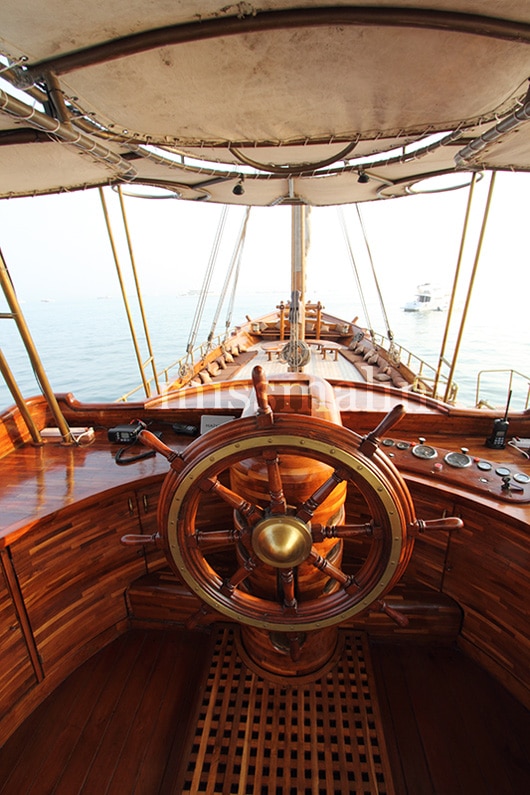
- Engineering jobs, which are obviously heavy in maths and science
- Captain/Skipper, where you would be in command of your vessel
- Couples, where you and a partner with training in another area could be hired onto the same vessel. A skipper/cook pairing is popular for private yacht owners who are looking to staff their vessel for a trip
- Deckhands, which involves cleaning, maintenance, and other odd jobs
- Mates, usually second in command and responsible for the well-being of the crew
- Delivery crew, responsible for deliveries to and from the yacht
- Interior (Stewardess/Chef), typical hospitality jobs such as serving and cooking for passengers
- Instructing, where you would share your knowledge with others interested in the industry.
How much can you make?
The amount of money you can make in the yachting industry depends largely on experience, location, and the type of vessel you’re working on. Typically, working on a private yacht pays less. But, you could have extra perks you wouldn’t otherwise have on a commercial yacht. For example, quality of life might be better in regards to living space and the people you’re working for – if they like you – could keep you around for future expeditions.Here are the average salaries, provided by Superyacht.co.uk.
- Captain
- Yachts up to 30m: £3,500 – £5,500 per month
- Yachts 30-50m: £4,500 – £7,000 per month
- Yachts over 50m: £6,000 – £10,000 per month
- Chief engineer
- £2,500 – £4,500 per month for smaller yachts
- £3,800 – £5,500 per month for larger yachts
- First & Second officer
- Chief Steward/Stewardess
- £1,750 – £4,000 per month depending on the size of the yacht
- £3,500 – £5,000 per month as a purser (someone who oversees the stewards)
- Chef
- £1,750 – £2,250 per month as a starting salary that could increase to £2,500 – £4,000 per month
- Top chefs could earn up to £5,000
- Deckhand
- Entry level: £1,250 – £1,750 per month
- Experienced: £1,750 – £2,000 per month
An afternoon at sea
I had the pleasure of traveling down to the Isle of Wight to visit UKSA’s headquarters in Cowes. After taking the ferry from Southampton, I landed in West Cowes and easily found their site after a short walk through the charming area.
 I
was greeted by a friendly and accommodating staff who immediately made
me feel at home. Nearly everyone I spoke with told me that, although the
area seemed quiet now, when the cadets return to the base in October
the marina comes alive with activity.
I
was greeted by a friendly and accommodating staff who immediately made
me feel at home. Nearly everyone I spoke with told me that, although the
area seemed quiet now, when the cadets return to the base in October
the marina comes alive with activity.
Most of my morning was spent with Emma Baggett, the industry and cadetship manager. She explained how, as a charity, everything UKSA does goes into changing the lives of the people involved. From younger students to youth offenders to the middle aged who simply want a change in their life, they strive to build character, provide leadership skills, and turn lives around.
I found this stance incredibly admirable, and everyone I spoke with was so genuinely thrilled about the work they were doing. It’s obvious when someone isn’t happy in their work, but I didn’t detect a trace of that in UKSA’s staff.
My opinion of this truly wonderful charity only improved after I spent my afternoon sitting in on an Ocean Graduate course.
When I climbed on board Falcon (the largest yacht in UKSA’s fleet at 42 feet) I didn’t know what to expect. Up until that morning, I didn’t know very much about UKSA aside from the reading I’d done in preparation for my visit.
For whatever reason, I was under the impression I would be with an advanced group of students. As it turned out, the five men I found myself on deck with had only been on the water for two days. This was their third.
They were under the supervision of Jess Dawkes, a former UKSA student before the charity hired her on as an instructor. She was upbeat, knowledgable, and fitted in effortlessly with the students – exactly the type of person you’d want to learn from.
Her students were a lively bunch: Paul Somerville, Russ Lecroy, Johannes Kraushofer, Olly Yates and Peter Feenstra. Peter was from Holland and Johannes from Austria, but otherwise they all called Britain their home.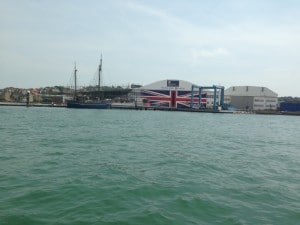
I could hardly tell this crew had been together for only a few short days. They already had inside jokes, funny stories to share with me and a friendly banter you might find among lifelong friends. They made fun of Jess’s singing voice and affectionately called Ross ‘mother’ (as his job for the day was providing food and drink for everyone else on board). Although they spoke English well, Peter and Johannes struggled a bit with British slang. They said their short time aboard Falcon, learning the ins and outs of sailing a yacht, helped them improve their understanding of the language.
Being forced together in such a small space does that to you, they told me. You don’t really have much of a choice but to get along. Already, I was impressed by what UKSA had brought out in these men in such a short amount of time.
“Maybe you can come train here,” Jess joked after a tour of the yacht where she showed me the bunk beds, sitting area and small kitchen.
I replied that I didn’t think I’d be much use. Aside from some experience with kayaking and rowing, I don’t have any boat experience. On top of that, I’m horrible at maths – something that UKSA strongly urges its students to have skills in.
“That’s what I thought,” Russ told me. “But it’s amazing how much you learn in such a short amount of time.”
The crew’s training was put to the test when they practiced a man overboard scenario.
“Do you really put someone overboard?” I asked Jess as they prepared for the simulation.
Jess laughed and assured me that, no, they definitely don’t. I soon learned why.
The dummy, ‘Bob’, was tossed over the back of the yacht. The acting skipper assigned everyone a task – someone had to continuously point at Bob’s position and call out his distances from the boat, two of the men worked on a harness to lower down one of the crew and collect the dummy, and so on. Jess was at the side of the acting skipper – Russ – the entire time, offering him advice and tips as the simulation progressed.
We had to turn the boat around a couple times. By the time we actually reached Bob, we’d knocked his head with the side of the yacht.

“That,” Jess told me, “is why we don’t do it with a real person.” It takes 15 minutes to die in the water during the summer. Two minutes in the winter.
After Bob was collected (with a slight concussion), the crew gathered around Jess to discuss what went right, what went wrong and everything inbetween. Everyone readily admitted their mistakes, asked questions, paid each other compliments, and were eager to learn and improve. After the recap, they performed the simulation again. This time, it went a lot smoother. I could tell the men had really taken into account what they’d learned and put it to use.
After my experience, I can honestly say UKSA is a remarkable organisation and worth checking out if you’re at all interested in the yachting industry. I’ve seen firsthand how their instructors operate, and how well the students grow and improve from the curriculum in just a matter of hours.
In the short time I was there, I went from mildly apprephensive about being on the water to wanting to buy my own yacht and sail around the world! I’m certain UKSA can help you find a new, well-paid direction in life.
Resource : http://nipun-frendshipspot.blogspot.com/





